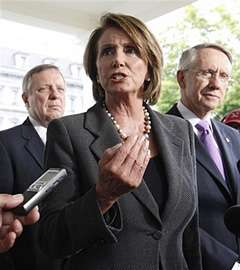 |
 |
 |
 News from Around the Americas | September 2007 News from Around the Americas | September 2007  
At Least 10 More Years in Iraq
 Agence France-Presse Agence France-Presse
go to original


| | House Speaker Nancy Pelosi, D-Calif., center, speaks to reporters as Senate Majority Leader Harry Reid, D-Nev., right, and Sen. Dick Durbin, D-Ill., watch on after their meeting with President Bush regarding Iraq at the White House in Washington, Tuesday, Sept. 11, 2007. (AP/Charles Dharapak) |
Democrats charged General David Petraeus's latest Iraq strategy was a blueprint for 10 more years of war, as they rejected "rosy" claims of battlefield progress and demanded a speedy US withdrawal.

The Democratic counter-attack came as President George W. Bush prepared to address Americans on future Iraq strategy on Thursday, and war commander Petraeus endured a roasting in Congress.

"President Bush's policy announced by General Petraeus is a path to 10 more years of war in Iraq," said Nancy Pelosi, speaker of the House of Representatives in a statement after meeting the president at the White House.

"General Petraeus' testimony to Congress drew a bright line: redeployment is not an option; endless war in Iraq is the administration's only option."

Petraeus said during two days of marathon congressional testimony that the "surge" of some 30,000 more troops into Baghdad was working, and that US troop numbers could recede back to around 130,000 by next summer.

But Pelosi slammed such a scenario as "an insult to the intelligence of the American people."

The White House said Bush would make a live televised address at 9:00 pm Thursday (Friday 0100 GMT).

Senate Democrats argued the surge had failed in its prime goal -- forging political reconciliation between Iraq's warring factions.

"We should stop the surge and start bringing our troops home," said senior Democratic Senator Joseph Biden.

Carl Levin, another veteran Democrat, said claims the surge was working was part of a "litany of delusion" by the Bush administration on Iraq.

Democratic presidential front-runner Hillary Clinton said the reports by Petraeus and US ambassador to Baghdad Ryan Crocker demanded the "willing suspension of disbelief."

Petraeus and Crocker appeared before tense hearings of the Senate Foreign Affairs and Armed Services committees, which came on the sixth anniversary of the September 11 attacks, a day of deep political significance here.

The White House argued in a statement that success in Iraq would be a "terrible blow" to US enemies in the 'war on terror' and extremists had to be battled there, rather than on US soil.

But another Democratic presidential hopeful Senator Barack Obama, said it was wrong to hold a hearing on a day filled with echoes of the attacks.

"It perpetuates this notion that, somehow, the original decision to go into Iraq was directly related to the attacks on 9/11," he said.

Petraeus, who testified before the House of Representatives on Monday, said US forces could gradually be reduced from their current 168,000 strength, to pre-surge levels of around 130,000 by mid-2008.

But Democratic Senator Barbara Boxer accused the general of painting an overly optimistic picture.

"I ask you to take off your rosy glasses," she said. "We are sending our troops where they are not wanted, with no end in sight, in the middle of a civil war, in the middle of the mother of all mistakes."

Republican war critic Chuck Hagel had a similar complaint.

"Are we going to continue to invest American blood and treasure at the same rate as we are now? For what?"

But Republican presidential hopeful Senator John McCain, a staunch defender of the surge, warned: "The consequences of American defeat in Iraq will be terrible and longlasting."

"Iraq has become the central front of the global war on terror."

Ripples from Petraeus's testimony spread worldwide, with the general set to head to London to discuss the British military's handover of security in the southern city of Basra to Iraqi forces.

Britain said Tuesday its approach to Iraq would not be changed by Petraeus's upbeat testimony. France meanwhile said there was no military solution in Iraq and called for an eventual US withdrawal.

Meanwhile, Iraq's National Security Advisor Muwaffaq al-Rubaie told reporters that he expected US forces to cut back on combat duties soon.

"We anticipate in the near term a relaxation of the requirement for coalition forces to be in direct combat operation," he said in Baghdad.

But he cautioned against a quick withdrawal of US troops, echoing Petraeus in his testimony on Monday, saying the coalition forces were needed until Iraq's own security forces were self-reliant. | 
 | |
 |



